Wildlife conservation in the Mediterranean is vital for preserving biodiversity, stabilizing ecosystems, and protecting cultural heritage. Effective practices include habitat restoration and sustainable land management. Ethical guidelines emphasize community involvement and respect for local cultures. Addressing challenges like habitat loss and climate change is crucial for the region’s wildlife resilience.
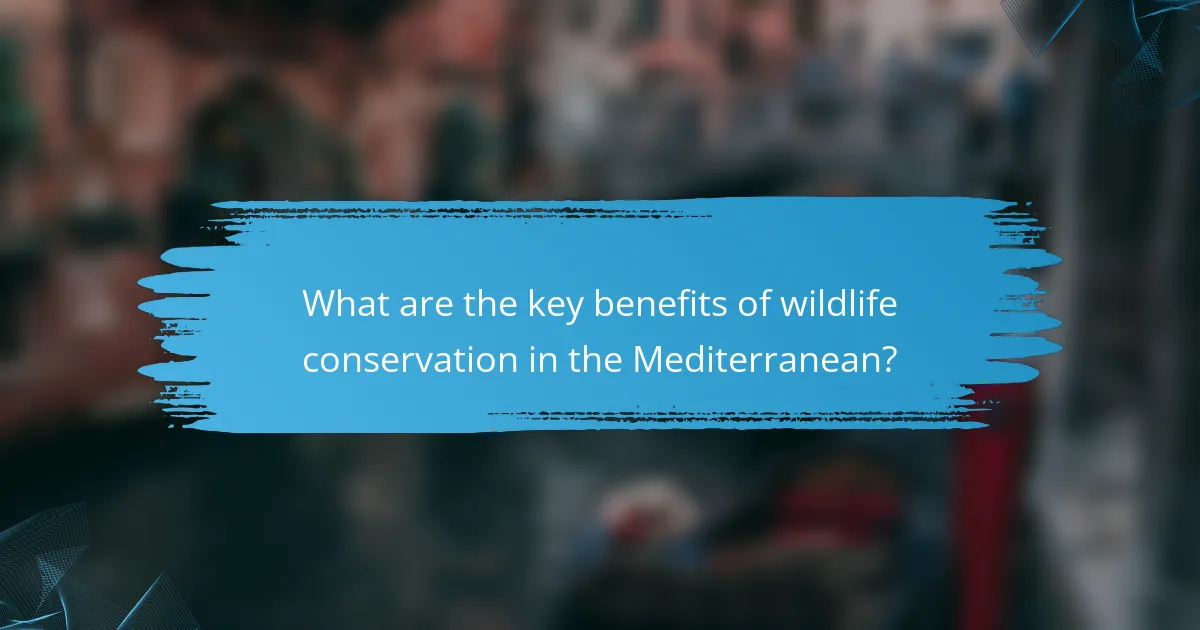
What are the key benefits of wildlife conservation in the Mediterranean?
Wildlife conservation in the Mediterranean offers critical benefits, including biodiversity preservation, ecosystem stability, and cultural heritage protection. These efforts enhance tourism, support local economies, and mitigate climate change impacts. Effective conservation practices ensure sustainable resource management and promote ethical guidelines for wildlife interactions.
How does biodiversity contribute to ecosystem stability?
Biodiversity enhances ecosystem stability by promoting resilience, productivity, and adaptability. Diverse species contribute to various ecological functions, ensuring balance and recovery from disturbances. For example, in Mediterranean ecosystems, a wide range of plant and animal species supports soil health and nutrient cycling, which are vital for sustaining ecosystems. Increased biodiversity also helps mitigate the impacts of climate change, making ecosystems more robust against extreme weather events.
What economic advantages arise from conservation efforts?
Wildlife conservation in the Mediterranean offers significant economic advantages. These efforts boost tourism, enhance ecosystem services, and promote sustainable fisheries.
Tourism related to wildlife observation generates revenue and creates jobs. Protected areas attract visitors, benefiting local economies. Ecosystem services, such as pollination and water purification, support agriculture, reducing costs for farmers. Sustainable fisheries ensure long-term fish stocks, promoting food security and economic stability for coastal communities.
Investing in conservation leads to healthier ecosystems, which in turn support diverse economic activities. This synergy fosters resilience against climate change impacts, further safeguarding economic interests in the region.
Why is cultural heritage linked to wildlife preservation?
Cultural heritage is linked to wildlife preservation because both share a common goal of maintaining ecological balance and promoting biodiversity. Traditional practices often incorporate sustainable methods that protect both the environment and cultural identities. For instance, local communities in the Mediterranean have developed agricultural practices that support wildlife habitats while preserving their cultural landscapes. These intertwined relationships enhance conservation efforts by fostering community involvement and respect for local traditions. As a result, the preservation of cultural heritage can lead to more effective wildlife conservation strategies.
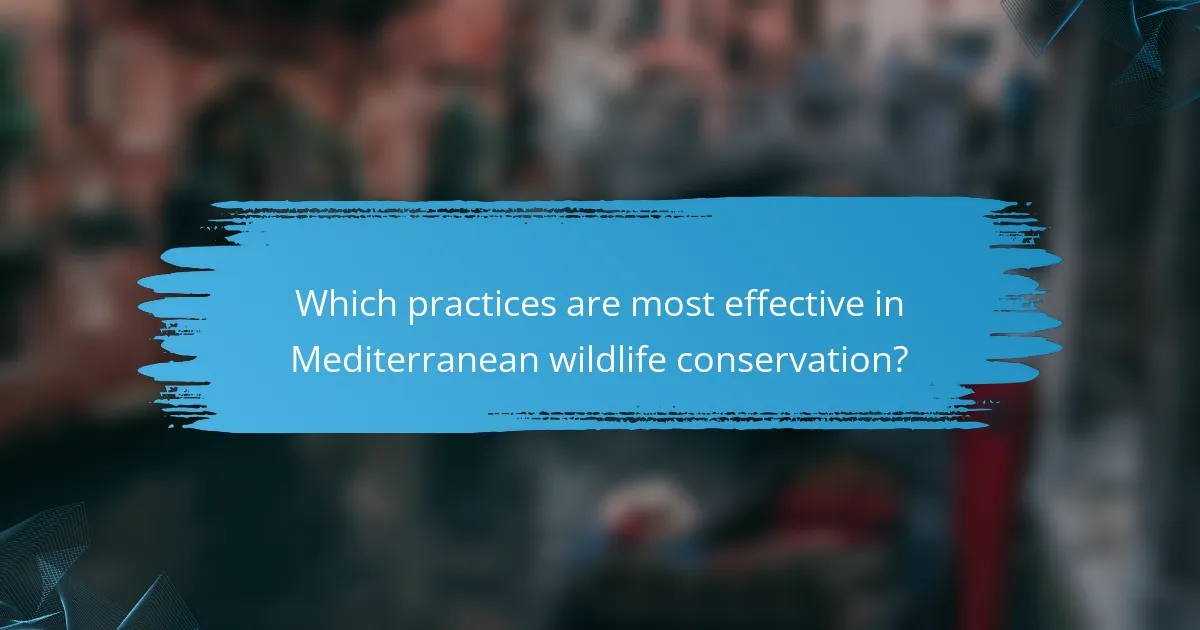
Which practices are most effective in Mediterranean wildlife conservation?
Effective practices in Mediterranean wildlife conservation include habitat restoration, sustainable land management, and community engagement. These strategies enhance biodiversity and ensure ecosystem resilience. Collaborative efforts among local communities, governments, and NGOs are crucial for successful conservation initiatives. For instance, reforestation projects have shown significant positive impacts on local wildlife populations.
How do protected areas enhance biodiversity?
Protected areas significantly enhance biodiversity by providing habitats for various species, protecting ecosystems, and promoting genetic diversity. These regions prevent habitat destruction and offer refuge for endangered species. Studies indicate that protected areas can increase species richness by up to 30%. Furthermore, they support ecosystem services like pollination and water purification, crucial for human well-being. Effective management practices within these areas ensure sustainable use of resources while maintaining ecological balance.
What role do community engagement and education play?
Community engagement and education are vital for successful wildlife conservation in the Mediterranean. They foster awareness, promote sustainable practices, and encourage local participation.
Engaging communities helps build a sense of ownership over conservation efforts. This involvement leads to increased compliance with conservation measures and enhances the effectiveness of initiatives. Education provides essential knowledge about local ecosystems, biodiversity, and the benefits of conservation, empowering individuals to contribute actively.
Moreover, educational programs can address unique challenges faced by specific regions, such as overfishing or habitat loss. By tailoring content to local needs, these programs can effectively motivate communities to adopt conservation-friendly behaviors. As a result, both community engagement and education significantly enhance the long-term sustainability of wildlife conservation in the Mediterranean.
Which technologies are transforming conservation methods?
Technologies transforming conservation methods include satellite imagery, drones, and artificial intelligence. Satellite imagery enables real-time monitoring of ecosystems and wildlife habitats. Drones provide aerial surveys, enhancing data collection while minimizing human disturbance. Artificial intelligence analyzes vast data sets, improving decision-making in conservation strategies. These innovations increase efficiency, accuracy, and effectiveness in wildlife conservation efforts across the Mediterranean.
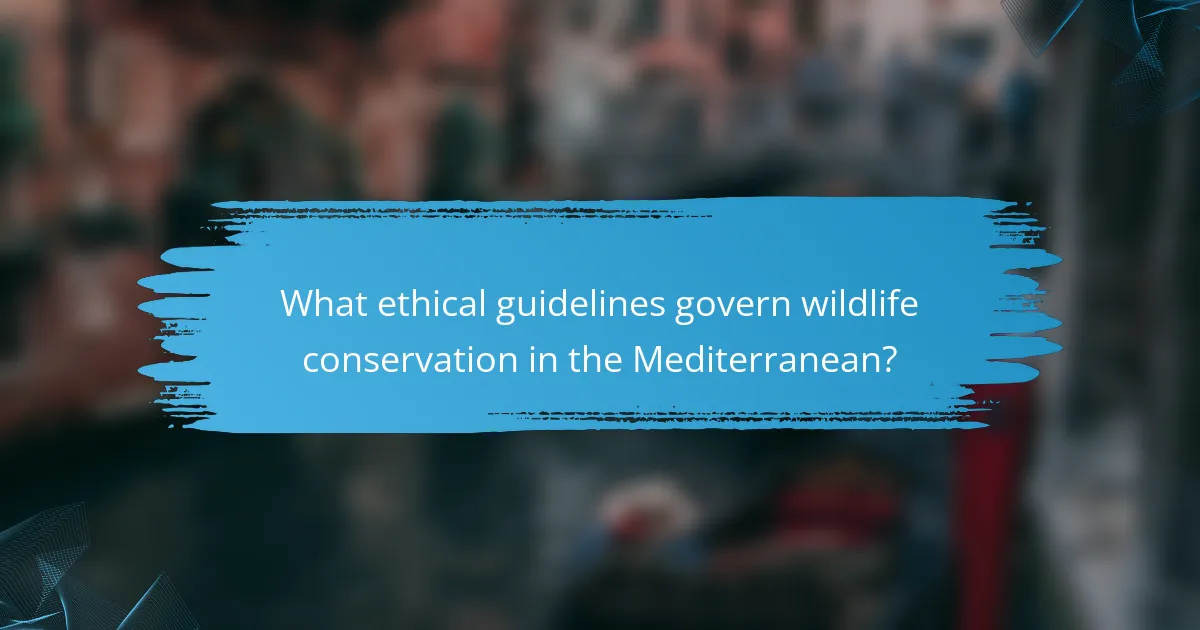
What ethical guidelines govern wildlife conservation in the Mediterranean?
Ethical guidelines for wildlife conservation in the Mediterranean prioritize biodiversity protection, sustainable practices, and community involvement. These guidelines aim to balance ecological integrity with human interests, ensuring that conservation efforts are effective and equitable. Key principles include respecting local cultures, promoting education, and fostering collaboration among stakeholders. Additionally, adherence to international agreements enhances the ethical framework guiding conservation actions in this region.
How do conservation laws vary across Mediterranean countries?
Wildlife conservation laws vary significantly across Mediterranean countries due to differing legal frameworks, biodiversity priorities, and enforcement capabilities. For instance, Spain emphasizes habitat protection under the Natura 2000 network, while Italy focuses on endangered species legislation. Greece has unique challenges with illegal hunting despite strong laws. These variations impact the effectiveness of conservation efforts and the protection of the region’s rich biodiversity.
What are the principles of sustainable tourism in wildlife areas?
Sustainable tourism in wildlife areas focuses on minimizing environmental impact while promoting conservation. Key principles include protecting habitats, supporting local communities, and ensuring ethical wildlife interactions. These practices foster biodiversity and promote long-term ecological balance. Engaging tourists in conservation efforts enhances awareness and generates funding for wildlife protection.
How can ethical hunting practices support conservation?
Ethical hunting practices can significantly support wildlife conservation by promoting sustainable population management and habitat protection. These practices often involve regulated hunting that aligns with conservation goals, ensuring species’ longevity. For instance, funds generated from licensed hunts can be directed towards habitat restoration efforts and anti-poaching initiatives. Moreover, ethical hunters often contribute to research and monitoring programs, enhancing data collection on wildlife populations. This collaborative approach fosters a balance between human activity and ecosystem health, ultimately benefiting biodiversity in the Mediterranean region.
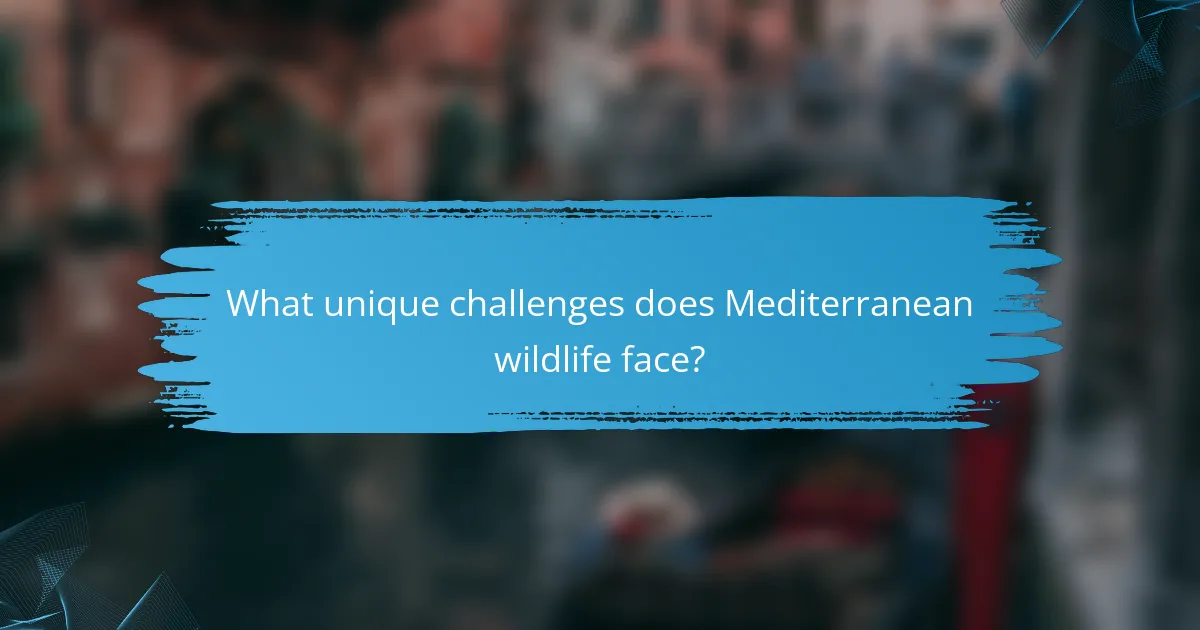
What unique challenges does Mediterranean wildlife face?
Mediterranean wildlife faces unique challenges including habitat loss, climate change, and invasive species. These factors threaten biodiversity and disrupt ecosystems. Habitat destruction primarily results from urban development and agriculture, reducing available space for native species. Climate change alters temperature and precipitation patterns, impacting food sources and migration routes. Invasive species outcompete native flora and fauna, leading to declines in local populations. Conservation efforts must address these challenges to protect the region’s rich biodiversity.
How does climate change impact local ecosystems?
Climate change significantly disrupts local ecosystems, affecting biodiversity and wildlife conservation efforts in the Mediterranean. Rising temperatures and altered precipitation patterns threaten habitats, leading to species migration and extinction. For instance, increased sea temperatures impact marine life, while droughts affect terrestrial species’ survival. As a result, conservation practices must adapt to these changes, ensuring ethical guidelines prioritize ecosystem resilience and species protection.
What invasive species threaten native wildlife?
Invasive species such as the brown tree snake, common myna, and feral cats threaten native wildlife in the Mediterranean. These species disrupt ecosystems, outcompete native species, and contribute to biodiversity loss. For instance, feral cats significantly reduce populations of native birds and small mammals. The introduction of these invasive species often results from human activities, including trade and habitat alteration. Addressing this issue is critical for effective wildlife conservation efforts in the region.
Which human activities pose the greatest risks?
Human activities that pose the greatest risks to wildlife conservation in the Mediterranean include habitat destruction, pollution, overfishing, and climate change. These actions threaten biodiversity and disrupt ecosystems.
Habitat destruction occurs through urban development and agriculture, leading to loss of critical habitats. Pollution, including plastic waste and chemical runoff, contaminates marine and terrestrial environments. Overfishing depletes fish populations, disrupting food chains. Climate change alters weather patterns and sea levels, further impacting wildlife.
Effective conservation practices must address these risks through sustainable development, pollution control, and responsible fishing regulations. Ethical guidelines emphasize the importance of preserving natural habitats and promoting biodiversity.
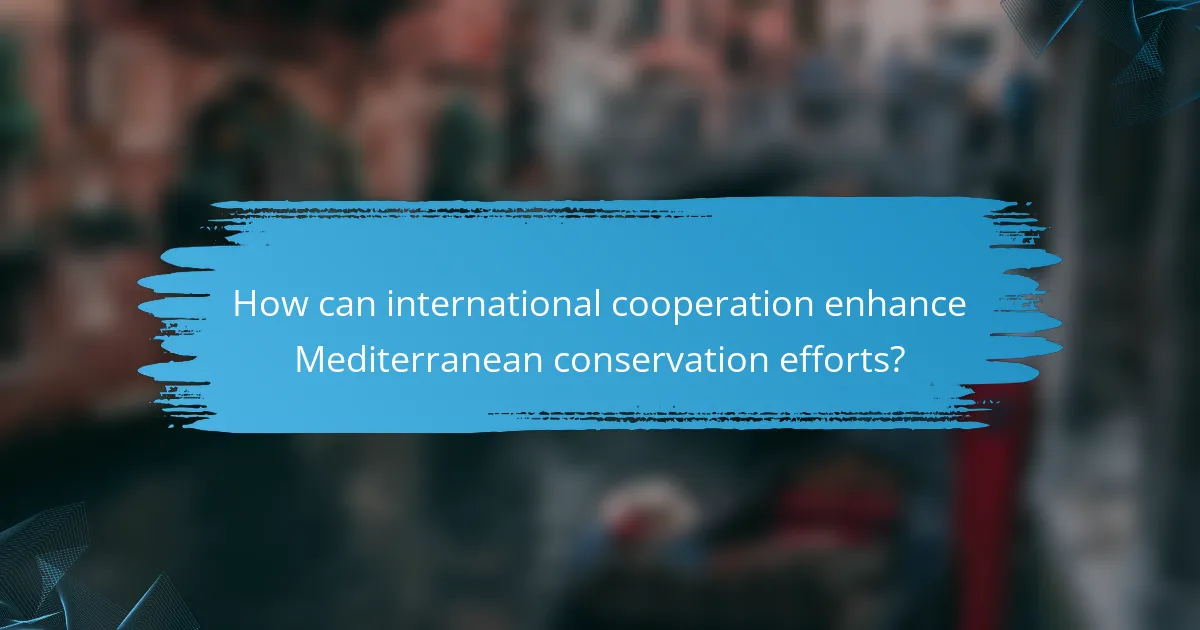
How can international cooperation enhance Mediterranean conservation efforts?
International cooperation can significantly enhance Mediterranean conservation efforts by fostering collaboration, sharing resources, and aligning policies. Joint initiatives improve biodiversity protection and promote sustainable practices across borders. For example, transboundary protected areas enable better wildlife management and habitat preservation. Collaborative research leads to more effective conservation strategies tailored to regional needs. Additionally, pooling funding and expertise amplifies the impact of conservation programs, ensuring long-term sustainability and resilience of Mediterranean ecosystems.
Which organizations are leading cross-border initiatives?
Several organizations lead cross-border wildlife conservation initiatives in the Mediterranean. Notable entities include the Mediterranean Information System on the Environment and Sustainable Development, the International Union for Conservation of Nature, and the WWF Mediterranean Programme. These organizations focus on collaborative practices, policy development, and ethical guidelines to enhance biodiversity protection across national boundaries. Their efforts emphasize the benefits of shared resources and knowledge in addressing environmental challenges in the region.
What role does research collaboration play in effective conservation?
Research collaboration enhances effective conservation by pooling resources, expertise, and data. It fosters innovative solutions to complex challenges in wildlife conservation across the Mediterranean. Collaborative efforts improve knowledge sharing, leading to more informed decision-making and sustainable practices. For instance, partnerships among researchers, NGOs, and local communities can address specific conservation needs, such as habitat restoration and species protection. As a result, these collaborations significantly increase the likelihood of successful conservation outcomes.
How can policy alignment improve conservation outcomes?
Policy alignment significantly enhances conservation outcomes by ensuring that regulations and practices are coordinated across sectors. This collaborative approach fosters effective resource management and promotes biodiversity protection. For instance, aligning agricultural policies with conservation efforts can reduce habitat loss while supporting sustainable farming practices. Additionally, unified policies can streamline funding and support for conservation initiatives, ultimately leading to more successful wildlife preservation in the Mediterranean region.
What are the best practices for engaging local communities in conservation?
Engaging local communities in conservation requires inclusive practices that respect their knowledge and needs. Collaborate with community leaders to establish trust and shared goals. Foster educational programs that highlight local biodiversity and conservation benefits. Encourage participation through volunteer opportunities and sustainable livelihood initiatives. Recognize and integrate traditional ecological knowledge to enhance conservation efforts.